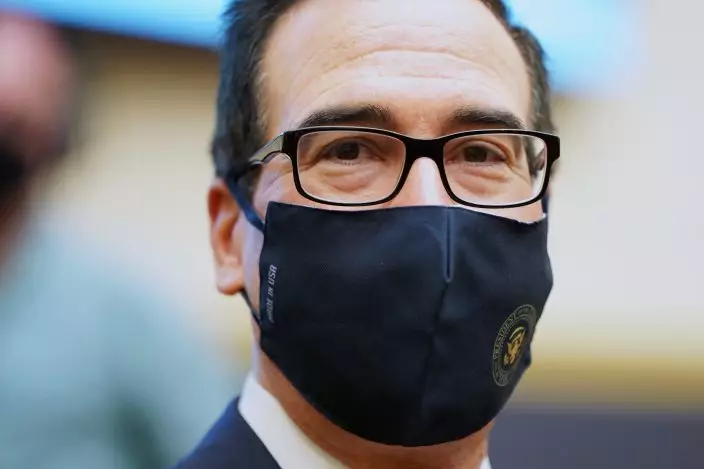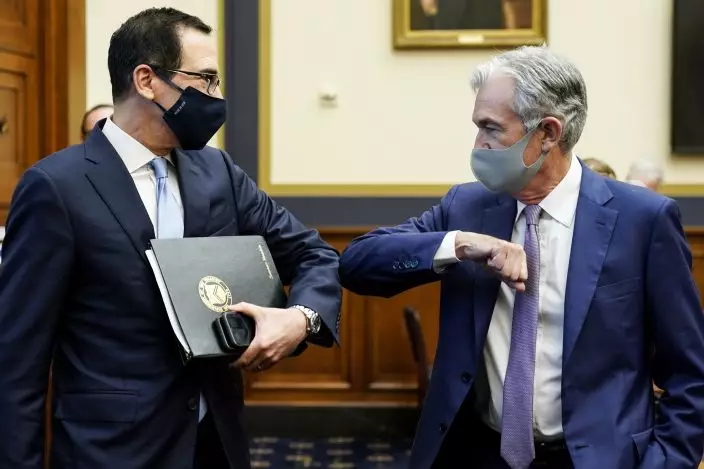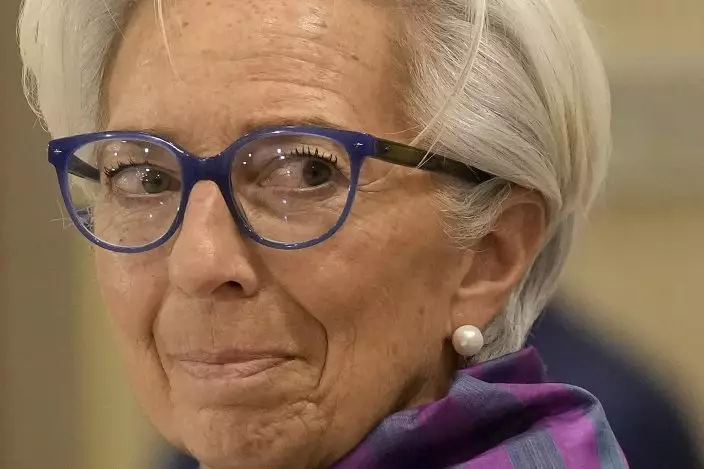Federal Reserve Chairman Jerome Powell and Treasury Secretary Steven Mnuchin expressed cautious optimism Tuesday that the U.S. economy is rebounding from the pandemic-induced recession with federal support but that more help from the government is likely needed.
Powell told the House Financial Services Committee that he believed the economy was “healing.” Mnuchin, the chief economic spokesman for the Trump administration, proclaimed that the country was in the “midst of the fastest economic recovery from any crisis in history.”
Striking a more cautious note, Powell noted that the job market has regained only about half the 22 million jobs that were lost in March and April when the virus flattened the U.S. economy, triggering a recession.

Treasury Secretary Steven Mnuchin wears a face mask as he arrives for a House Financial Services Committee hearing about the government’s emergency aid to the economy in response to the coronavirus on Capitol Hill in Washington on Tuesday, Sept. 22, 2020. (Joshua RobertsPool via AP)
Both officials stressed that major sectors of the economy were still suffering.
Some Republican lawmakers complained that House Democrats were blocking approval of further relief because of their insistence on achieving a larger package than GOP lawmakers are willing to support.
Mnuchin said he was ready to resume negotiations and said that the administration would be willing to support stand-alone legislation to boost support through the Paycheck Protection Program, which benefited small businesses.

Treasury Secretary Steven Mnuchin, left, greets Federal Reserve Chair Jerome Powell with an elbow bump before the start of a House Financial Services Committee hearing about the government’s emergency aid to the economy in response to the coronavirus on Capitol Hill in Washington on Tuesday, Sept. 22, 2020. (Joshua RobertsPool via AP)
“We are in a very different situaiton than we were the last time” when Congress pushed through nearly $3 trillion in support. “At that time, the entire economy was shut down.”
Powell said that further support should be more targeted to industries such as restaurants and the travel industry that have been most impacted.
The Federal Reserve must move faster than it has in the past to rein in high inflation, Chair Jerome Powell said Thursday, signaling that sharp interest rate increases are likely in the coming months, beginning at the Fed's next policy meeting in May.
In a panel discussion held by the International Monetary Fund during its spring meetings, Powell also suggested that “there's something in the idea of front-loading" aggressive rate hikes as the Fed grapples with inflation that has reached a four-decade high.
“So that does point in the direction of (a half-point rate increase) being on the table" for the Fed's policy meeting May 3-4, Powell said. Typically in the past, the Fed has raised its benchmark short-term rate by more modest quarter-point increments. When the Fed raises its rate, it often leads to higher borrowing costs for people and businesses, including those seeking to borrow to buy homes, cars and other costly goods.

FILE - President of the European Central Bank Christine Lagarde looks the Cyprus President Nicos Anastasiades during a press conference after their meeting at the Presidential Palace in the capital Nicosia, Cyprus, Wednesday, March 30, 2022. Lagarde could drop more hints Thursday, April 14, 2022 about when the bank will start raising interest rates, with pressure increasing to follow the United States, United Kingdom and other countries in taking a harder line to combat soaring consumer prices. (AP PhotoPetros Karadjias, File)
Wall Street investors already expect the Fed to raise its key rate by a half-point at its next three meetings, including those that will occur in June and July. Powell's comments Thursday underscored those expectations.
That would be the fastest tightening since 1994, when the Fed raised its rate by 1.25 percentage points over the course of three meetings.
By contrast, Christine Lagarde, president of European Central Bank, who took part in Thursday's discussion, sounded a much more cautious note. Inflation in the 19 countries that use the euro reached 7.5% last month, compared with a year earlier, the highest level since records began in 1997.
Yet Europe's economy faces a greater threat from Russia's invasion of Ukraine, which has sent food and particularly energy prices on the continent soaring and has weighed more on its economic growth than in the United States.
Lagarde said the ECB, at its next meeting in June, would decide when to end its program of bond purchases, which are intended to lower long-term interest rates. The Fed completed a similar effort in March. The ECB has set the July-September quarter as a target to stop buying bonds but hasn't been more specific.
One reason for Lagarde's caution, she said, is that about half of Europe's inflation is driven by high energy prices. Typically, interest rate policies can do little about such supply shocks.
“Our economies are moving at a different pace,” Lagarde said, referring to Europe and the United States, where growth has been faster. “Our inflation is fed by different components.”





